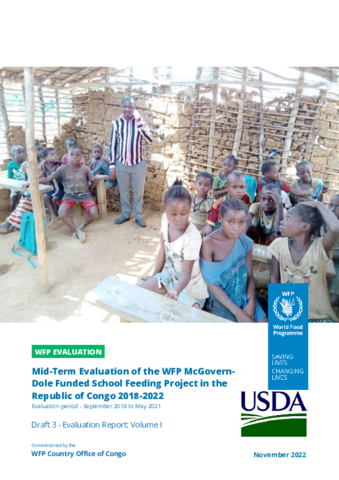
WFP Congo Country Office commissioned the decentralized evaluation which was conducted by KonTerra Group. The evaluation covered the McGovern-Dole project implemented in seven different departments, namely Pool, Plateaux, Cuvette, Bouenza, Lékoumou, Likouala and Sangha in the Republic of Congo from 2018 until 2021.
The COVID-19 pandemic delayed the 2020 Mid-Term Evaluation (MTE). Data collection took place 2nd – 28th May 2021.
MTE assessed progress towards McGovern-Dole outputs and outcomes, as well as whether the baseline recommendations were implemented and integrated into project's implementation and if these strengthened project implementations. The evaluation served the dual purpose of learning (and adjusting based on lessons) and accountability (for actions and results). The overarching evaluation question was to assess the performance of the project and the impact on targeted individuals and institutions.
Some of the key evaluation findings included:
- The McGovern-Dole project's food security activities were relevant in providing a social safety net for poor households. The project's model of using imported food was not coherent with the government's preference for home-grown food. Using locally produced food would help the local economy and allow the project to gain independence from foreign food assistance.
- Since the launch of the project, some activities intended to improve literacy had either not been implemented or had not been designed to correctly target objectives of school-aged children. Activities should be directly targeting the upper-level objective of improving the quality of education for children with dyslexia and reading difficulties.
- The project was successful in reaching its target, but logistic challenges had led to delays in distributing food to schools. Cost efficiency calculations for the school feeding component were limited due to variations in data reporting year to year.
- Results of the literacy test conducted for MTE revealed minimal differences concerning improvement in reading skills of students attending supported schools. The lack of substantial differences between supported and non-supported schools at midline highlights the need to review the assumption that activities to support attentiveness and enrolment, without changes in the quality of literacy instruction, can have a meaningful contribution to literacy outcomes.
- The Evaluation team recognized that WFP is working with the Ministry of Education as well as with the National School Feeding Directorate (NSFD) towards the objective of sustainability through capacity building. However, and, talking about a transition to a nationally owned school feeding project by the end of this phase of the McGovern-Dole project is unrealistic.
Key recommendations from the evaluation included:
- WFP should work with implementing partners to develop clear definitions of PMP indicators and a common methodology for monitoring and reporting
- WFP should prioritise resuming/starting capacity-building exercises that were postponed due to COVID-19
- WFP Congo should ensure that there is a complete infrastructure inventory of all McGovern-Dole assisted schools before the end of the project
- WFP Congo, with support from Regional Bureau Southern Africa (RBJ), should develop clear guidance on curriculum promoting dietary diversity
- WFP should ensure that an action plan is developed to ensure that the project activities also contribute to the objective of improving the literacy of school-age children.
- WFP RBJ with support from WFP HQ as necessary, should discuss with USDA the most appropriate ways to support school feeding in the region.
- WFP Congo with support from RBJ, UNICEF and other partners as appropriate, should ensure that gender transformative approaches are an integral part of the primary school curriculum.
